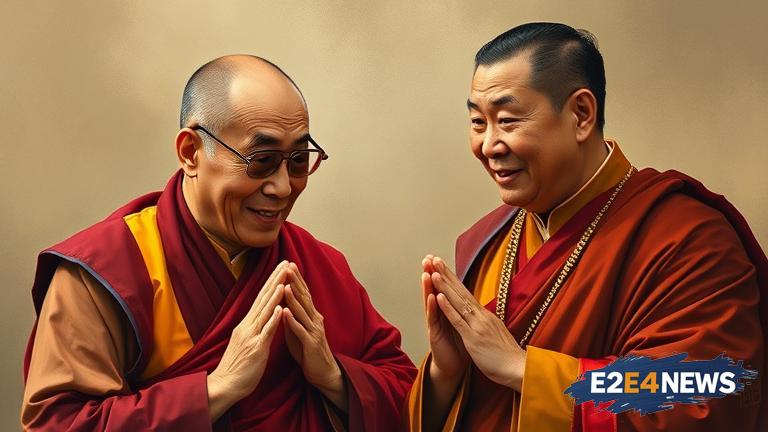The Dalai Lama, the spiritual leader of Tibetan Buddhism, has been a central figure in the region’s religious and political landscape for decades. As he approaches the end of his life, the question of his succession has become a pressing concern. The Dalai Lama’s succession is not just a matter of religious tradition, but also a geopolitical contest, with various countries and interests vying for influence. The Chinese government, which has long claimed sovereignty over Tibet, has been actively involved in the succession process, seeking to install a puppet leader who will toe the Communist Party line. However, the Dalai Lama and the Tibetan government-in-exile have rejected China’s claims, arguing that the succession process should be determined by Tibetan Buddhist tradition. The Tibetan Buddhist tradition holds that the Dalai Lama is reincarnated, and that the next incarnation will be identified through a series of tests and rituals. However, the Chinese government has sought to impose its own candidate, Gyaltsen Norbu, who was appointed as the 11th Panchen Lama in 1995. The Dalai Lama has rejected Gyaltsen Norbu, recognizing instead Gedhun Choekyi Nyima, a young boy who was kidnapped by Chinese authorities in 1995. The succession debate has significant implications for South Asia, where the Dalai Lama has played a key role in promoting regional stability and cooperation. The Indian government, which has hosted the Dalai Lama and the Tibetan government-in-exile since 1959, has been careful to balance its relations with China and its support for the Tibetan cause. Other countries in the region, including Nepal and Bhutan, have also been drawn into the succession debate, with some seeking to maintain good relations with China and others seeking to support the Tibetan government-in-exile. The United States and other Western countries have also been involved in the debate, with some calling for greater support for the Tibetan government-in-exile and others seeking to engage with China on the issue. As the Dalai Lama’s health declines, the succession debate is likely to become increasingly contentious, with significant implications for regional stability and cooperation. The Tibetan government-in-exile has sought to prepare for the succession by establishing a clear process for identifying the next Dalai Lama, but the Chinese government has rejected this process, seeking to impose its own candidate. The international community will be watching the succession debate closely, as it has significant implications for regional stability, human rights, and the future of Tibetan Buddhism. The Dalai Lama’s succession is a complex and sensitive issue, requiring careful consideration of the religious, cultural, and geopolitical factors at play. Ultimately, the succession debate will require a delicate balance of tradition, diplomacy, and geopolitics, as the various stakeholders seek to navigate the complex landscape of Tibetan Buddhism and regional politics.
